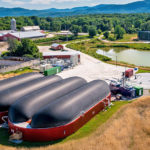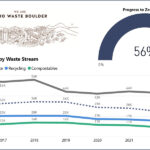Top: Residential organics cart photo courtesy City of Olympia, Washington.
A new bill, HB 1497, was introduced in the Washington State House of Representatives in January that is designed to improve outcomes associated with the state’s organic materials management systems. The legislation builds upon HB 2301, a law passed in 2024 that requires jurisdictions to have source separated organics (SSO) programs in place to collect residential food scraps, starting in 2027. Among the requirements proposed in HB 1497 is that — as a condition of receiving financial assistance — a local government recipient provide performance metric data for diversion, including the percentage of food that is source separated and levels of contamination. The bill also requires that the state Department of Ecology, which oversees implementation of HB 2301, develop an education and outreach toolkit that includes recommended performance metrics for use by counties and cities to measure residential organic materials diversion to productive uses. Language in the bill states that “the department must adopt rules to identify the minimum measurement and reporting requirements under this subsection necessary for a local government recipient to be eligible for funding under this section.”










